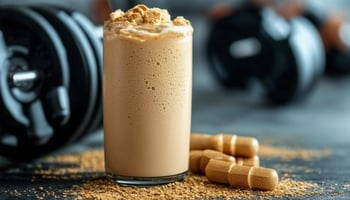New research findings have raised eyebrows: A certain dietary supplement is supposed to boost fat...
Can a dessert for breakfast really help you lose weight?
When it comes to diets, there are many rules: No sugar, low carbs, strict calorie control. But a scientific study turns these principles on their head and shows that people who ate dessert for breakfast lost more weight than those who did not. Sound incredible? Let's dive deeper.
The study that defied all expectations
Researchers divided the participants into two groups, both of which followed a calorie-controlled diet. Men were allowed to eat 1,600 calories a day, women 1,400 calories. The difference? One group enjoyed a dessert for breakfast (e.g. cookies, cake or donuts) along with a high-protein meal. The other group was given a low-carb, lower-calorie option.
After 16 weeks, an exciting picture emerged:
-
The low-carb group lost an average of 15 kg.
-
The dessert group lost almost as much, 13.5 kg.
But then came the second phase of the study: 16 weeks without strict control. No fixed guidelines, no weekly weighing appointments - the participants were asked to manage their eating habits independently.
The result was astonishing:
-
The low-carb group regained an average of 11 kg.
-
The dessert group lost a further 7 kg.
Why did the dessert work?
The researchers found that the dessert group had better dietary compliance. Their cravings for sweets were lower and they felt more satisfied. From week 8 onwards, they reported fewer cravings and greater satisfaction with their diet.
The bottom line? A diet doesn't have to be perfect, but it does have to be sustainable in the long term. Small treats can help you stick with it in the long term and not fall back into old patterns.
What does this mean for you?
The dessert group lost a total of 20 kg in 32 weeks without sacrificing indulgence. A balanced diet with plenty of protein, fiber and vegetables was important. This shows that Sustainable weight loss does not depend on total sacrifice, but on a diet that you can enjoy in the long term.
Sources:
-
Jakubowicz, D., Froy, O., Ahren, B., Boaz, M., & Barnea, M. (2012). Meal Timing and Composition Influence Metabolic Processes and Weight Loss Maintenance. Steroid Biochemistry & Molecular Biology Journal.





Wir freuen uns über dein Kommentar: